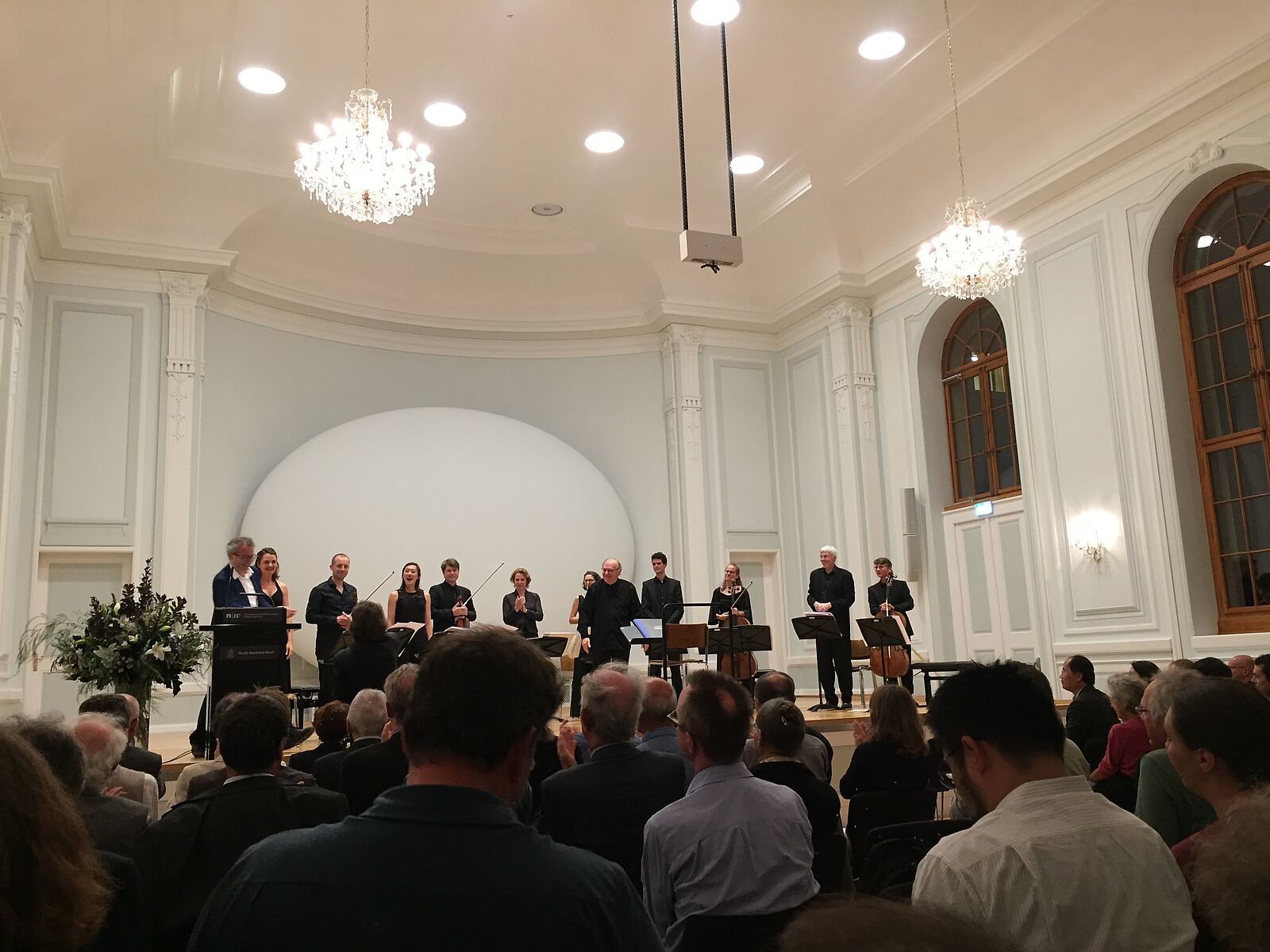2018 fand das Internationale Symposium der Schweizerischen Philosophischen Gesellschaft in Basel statt. 150 Philosophinnen und Philosophen von Argentinien bis Taiwan trafen sich im Kollegienhaus der Universität und zum Festakt im Grossen Saal der Musikakademie, um sich der Frage „Was ist Geist?“ zu stellen. Die Hauptvorträge hielten Sabina Lovibond (Oxford), Grit Schwarzkopf (Heidelberg), Gian Francesco Giudice (CERN) und Alexandrine Schniewind (Lausanne). Auf dem Festakt wurde neben der Präsidialansprache von Gunnar Hindrichs (Basel) Dániel Péter Birós Komposition „Scholium II“ uraufgeführt, die sich mit Spinozas Buch „Über den Geist“ (De Mente) auseinandersetzt (ensemble aisthesis, Schola Heidelberg, Leitung: Walter Nussbaum). Das Werk ist eine Auftragskomposition der Schweizerischen Philosophischen Gesellschaft.
Lesen Sie hier den Artikel der NZZ
Schauen Sie sich hier das Programm an
The question „What is Geist [mind/spirit]?“ is one of the fundamental questions of philosophy. It concerns our understanding of ourselves as conscious beings. We refer to our thoughts, our perceptions and our sensations as “mental states”. We wonder about the place of mind in the cosmos and in the evolution of nature. In the institutions that govern our actions we recognize the realization of a certain spirit: with Montesquieu we speak of the “spirit of laws”, with Hegel of the “objective spirit” of the state, with Max Weber of “protestant ethics and the spirit of capitalism” – or we are disturbed by the “new spirit of capitalism” (Luc Boltanski/Éve Chiapello) of our age. With Kant, we say that a work of art does not merely follow a certain set of rules, but that it has “spirit”, or – in the wake of Kandinsky – we search for the “spiritual in art”. In religion we are confronted with the concept of a “Holy Spirit” and the “Spirit of the Creator”. But what is Geist?
The conference explores possible answers to this question in 24 panels that range across six sections. Each panel contains three talks with subsequent discussions. In addition to the panel presentations there will be six keynotes by international speakers.
The conference languages are: German, French and English.
Sections
- Dimensions of Subjectivity
- Mind and Nature
- “Objective Spirit” – The Spirit or Demon of Society?
- The Spirit of Laws
- The Spiritual in Art
- The Problem of Transcendence
Die Frage „Was ist Geist?“ gehört zu den Grundfragen der Philosophie. Sie betrifft das Selbstverständnis unseres bewussten Lebens. Wir bezeichnen unser Denken, Wahrnehmen und Empfinden als „geistige Zustände“. Wir rätseln über die Stellung des Geistes im Kosmos und in der Evolution der Natur. Wir sehen in den Institutionen des Handelns einen bestimmten Geist verwirklicht: sprechen mit Montesquieu vom „Geist der Gesetze“, mit Hegel vom „objektiven Geist“ des Staates, mit Max Weber von der „protestantischen Ethik und dem Geist des Kapitalismus“ – oder sind vom „neuen Geist des Kapitalismus“ (Luc Boltanski/Éve Chiapello) unserer Zeit verstört. Wir sagen mit Kant, dass ein Kunstwerk nicht nur gewissen Regeln gemäß ist, sondern auch „Geist hat“, oder suchen mit Kandinsky nach dem „Geistigen in der Kunst“. Wir begegnen in den Religionen der Auffassung eines „Heiligen Geistes“ und eines „Schöpfer Geistes“. Was aber ist Geist?
Das Symposium geht den Antworten auf diese Frage nach. Es gliedert sich in sechs Sektionen mit insgesamt 24 Podien, auf denen jeweils drei Vortragende sprechen und sich der Diskussion stellen werden. Zu diesen Sektionen treten sechs Hauptvorträge, die von internationalen Referentinnen und Referenten bestritten werden.
Die Kongresssprachen sind Deutsch, Französisch und Englisch.
Sektionen
- Dimensionen der Subjektivität
- Natur und Geist
- „Objektiver Geist“ – Geist oder Ungeist der Gesellschaft?
- Der Geist der Gesetze
- Das Geistige in der Kunst
- Das Problem der Transzendenz
« Qu’est-ce que l’esprit ? » Cette question est l’une des questions fondamentales de la philosophie. Elle concerne la compréhension de nous-mêmes et de notre vie consciente. Nous disons que nos pensées, perceptions et sensations sont des « états mentaux ». Nous cherchons à expliquer la situation de l’esprit dans le monde et dans l’évolution de la nature. Nous disons percevoir dans les institutions un certain esprit : nous parlons de l’« esprit des lois » selon Montesquieu, de l’« esprit objectif » selon Hegel, de « L’Ethique protestante et l’esprit du capitalisme » selon Max Weber – ou nous sommes bouleversés à cause du « nouvel esprit du capitalisme » (Luc Boltanski/Éve Chiapello) de notre ère. Nous disons avec Kant qu’une œuvre d’art est non seulement conforme à certaines règles, mais encore qu’un « esprit » lui est propre, ou, selon Kandinsky, nous cherchons « le spirituel dans l’art ». Nous trouvons dans les religions la conception d’un « Saint-Esprit » et d’un « Esprit Créateur ». Mais qu’est-ce que l’esprit ?
Le symposium examinera les réponses à cette question. Il s’articulera autour de six sections avec 24 podiums au total. Sur chaque podium, trois conférencières/ers feront chacun-e une présentation et participeront à une discussion. Aux sections s’ajouteront six conférences plénières qui seront données par des intervenant-e-s internationales-aux.
Les langues du congrès sont l’allemand, le français et l’anglais.
Sections
- Dimensions de la subjectivité
- Nature et esprit
- « Esprit objectif » – esprit ou esprit malfaisant de la société ?
- L’esprit des lois
- L’esprit en art
- Le problème de la transcendance
